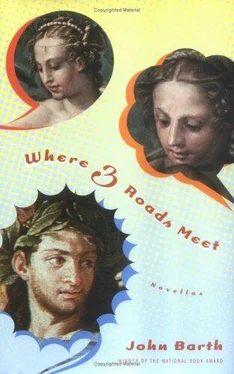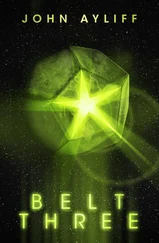As if from out of sight on the road's far side, "Gotta go now, ma'am," that old fellow's voice comes back. "Much obliged for the lift, guys. See you around. Maybe."
" Fre-ed?! "
But she understands the fitness of it, does our savvy Reader, sweetly disappointed but dramaturgically fulfilled; the fitness too of her not knowing whither trudgeth her aged admiree: back homeward or farther westward, none knows where. Upon that matter, should they discuss it, she and Izzy will disagree, Regina preferring to imagine Fred's ultimate Consummation in the bosom of his family, in the heart of their once-excellent city, Isidore inclining to a more mysterious, indeed unknown and unknowable finale somewhere out yonder — indeed, perhaps not even down the road after all, but off it: somewhere trackless, out beyond that far shoulder whence last we heard his voice.
Author himself refrains from tipping the scales either way. Enough, in his opinion, to have Regina recollect, aloud, that the Ur-Mythic script includes the possibility of our Hero's being, at the end, not really dead, but rather transmigrated to some Elsewhere — whence, in time, he will return…
"Isn't that so?" she demands of us back-seaters — and, without waiting for our opinion, calls fretfully across to where she last heard his voice: "Freddie? Isn't it so, hon? That we'll meet again someday, somewhere?"
To which, from a remove more distant than before, one barely hears his ancient voice reply (by Regina's hopeful account), "So I've been told. "
Or perhaps (as Izzy will prefer to tell it), "So: I've been told. "
TAPE 1
…dear Listener, before Grace noticed we'd forgotten to push the Record button on Junior's machine: This portion of the oral history of Manfred Dickson's famous novel-trilogy—
"Better say Dickson Senior's trilogy, Aggie. Manny Senior's infamous trilogy."
— Manfred F. Dickson Senior's once-notorious and controversial but now virtually forgotten masterwork, The Fates, okay? This unofficial contribution to the project (as I was saying, until Thelma interrupted me) will be the collective recollections of the Mason sisters, as recorded in our Bernbridge Manor apartments in Bernbridge, Maryland, on New Year's Eve 1999.
"Three burned-out former floozies in the Burnt-Bridge Old Farts' Home."
Have it your way, Thelm. These interruptions, I was saying, are courtesy of our irrepressible sister Thelma—
"Thalia the Unrepressed to you folks out there in Listener Land: a still-frisky seventy-pluser who likes to tweak her dear doddering elders."
Kid Sister Thelma/Thalia, all of eighteen months younger than the rest of us…
Which is to say, folks, just a tad younger than my twin sister Agatha — our Lead-Off Narrator, you might say — and her twin sister Grace (temporarily speaking), who'll transcribe these off-the-record recordings and add her two cents' worth as we go along. Aggie in roman type, Thelma in quotes, and me in italics ought to keep things clear. You were saying, Ag?
…Sister Thelma/Thalia, I was saying: still the sharp-tongued wiseass brat of our golden girlhood.
"Excuse me, sis: I hope and believe I have my head on straight, but my ass was never my wisest part."
Amen to that, for the three of us. Always remembering, however, girls, that once upon a time it was these tushies of ours that paid our way through college.
And made us secretly famous, Listener — as it were? Unbeknownst to any except ourselves and a certain… Señor Senior, shall we call him?
"If only we could call up old Manny, who made the Mason sisters… what? Anonymously famous? Temporarily immortal?"
As maybe we'll be again, less anonymously and temporarily, if Manny Junior has his way.
"Or if we have our way with Junior."
[Chuckles]
Imagine that, now: a Three-Way with that uptight little putz! Talk about wise!
Aggie's pun on Y's lost in transcription, Listener, as it will be in translation likewise (excuse me) if "Junior" 's critical study of his once-fairly-famous dad ever gets written, published, and translated into languages other than English. And hey, girls, we're piling up inside jokes and allusions at such a clip that this oral history of ours is going to need footnotes and commentaries.
Leave those to Herr Doktor Professor Junior: It's what prissies like him are for, right? He wants oral, we'll give him oral.
"Plus vaginal and anal! The old Mason-Dixon Three-Way!"
You wish. But Gracie's got a point there: We probably ought to start over.
Would that we could. From scratch.
"As in You scratch mine and I'll scratch yours?"
Scratch the interruptions, Thal, or we'll never get our effing story told.
"Our Effing Story…"
As I was saying, people — or've been trying to get said from Square One? Better yet, Grace: You fill the folks in, orally or otherwise, and then we'll get on with our three-part harmony. Tell 'em where we're coming from, and why.
"And where all our coming went, and why all those Y's in Manny's Fates …"
Speaking of Y's, guys — Y's-guys? — Y2K's about to hit Times Square, and how many turn-of-the-millenniums do we Once-and-Future Immortals get to raise a glass to? So be a good sis and pop us some bubbly, Thal, while Aggie fetches the flutes and I slug a fresh tape into Junior's gizmo—
"Now that sounds like fun."
— and tomorrow we'll start over.
"Hah. Spare me."
What I suggest, Grace, is that instead of us starting a new tape now, you write up some kind of introduction to this big-deal oral history—
"Right on, Agatha. Grace has always been the family scribbler, see, Listener: term papers for the three of us back in college days; bookkeeping ledgers for our little business; suggestions and corrections for Manny's scripts. Manny-scripts? Not to mention diaries …"
Not to mention certain better-she-hadn't-kept-'em diaries. But as I was saying: Let's clink glasses now, and then at Happy Hour tomorrow Grace'll read her scribbles and we'll take it from there: Lambda Upsilon! Dining at the Y! The works!
You'll do the reading, Aggie. I just cook the books.
[Knowing chuckles. Pop of champagne cork. Strains of Auld Lang Syne from TV coverage of millennial New Year's Eve festivities.]
So: To inspiration?
"We all know what that means. Bottoms up!"
[More chuckles. Clink of glasses.]
Here's to us, then.
"To us."
Us.
And now it's tomorrow already, everybody — specifically, half an hour and one glass of Mumm Brut into January 1, 2000, which astronomer types tell us isn't really the new millennium's kickoff, but never mind those party poopers — and no need for a new tape yet, 'cause there's room enough left on this one to explain that a letter recently arrived at Bernbridge Manor addressed to Ms. Grace Mason [Forester] (my former married name set like that in brackets) and letterheaded Arundel University, which used to be Arundel State University, which used to be Arundel State College, which used to be Arundel State Teachers College when Agatha and Thelma and I worked our butts off, so to speak, to earn our degrees there back in the fifties. To my less-than-total surprise — and Aggie's and "Thalia" 's when I passed the thing around — it was a very lengthy letter of introduction from one Dr. Manfred F. Dickson Jr., Ph.D., professor of social history at Arundel U. and son of "the undeservedly neglected writer of the same name," whom he understood my sisters and me to have known in his father's "formative years." Perhaps we had heard, the letter went on, that nearby Mason-Dixon University (a considerably more upscale operation, Listener, than our ASTC/ASC/ASU/AU) — Manfred Senior's alma mater, where he'd later taught for a few years while writing the first and second volumes of The Fates, and where Manfred Junior had been born and raised until his parents split and the ruckus over those books got his old man sacked — was belatedly and cautiously reappreciating their notorious alumnus, as were some literary historians, and had proposed to name a new classroom building, or at least one of its seminar rooms, in his honor. Not surprisingly, even the more modest of these proposals was meeting with resistance from conservative trustees of the university. The letter writer himself, he would have me know, much respected his father's work despite its "perhaps excessive ribaldry"; in the 1960s, after all, it had been regarded in some quarters as a comic/erotic epic: John Dos Passos's U.S.A. with sex, humor, and "mythopoeic fantasy"; Henry Miller's Tropics in the Age of Aquarius; "an in valuable sociohistorical record of mid-century America." He welcomed any renewed public controversy on the subject, Junior declared, despite the attendant associations with his parents' divorce, his mother's lifelong resentments, and his father's pitiable final years, inasmuch as he himself was at work on a three-volume historical/critical/biographical study of Manfred Senior's life and times, from his Roosevelt-era boyhood and eventual discovery of his vocation after several false starts, through the "mature" period of his fixation on the Heroic Cycle and his composition of the Fates trilogy between 1957 and 1963—the Eisenhower-Kennedy era of America's Korean and Vietnam wars and the U.S.-Soviet Cold War and space race — to his obscure end in the rebellious, counter-cultural high 1960s. Along the way, he declared, he hoped to "address and perhaps even resolve" such "cardinal mysteries of Dickson scholarship" as the author's obsession with threes in general and Y's in particular: obsessions that, together with the notorious Myth of the Wandering Hero, "bind the three otherwise disparate novels into a trilogy." And who, exactly, were the enigmatic "Gracious Masons, who lent me their ears," to whom the monumental work is cryptically thus dedicated (instead of to its author's long-suffering spouse, the letter writer's mother, "who surely deserved that honor")?
Читать дальше












